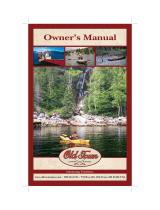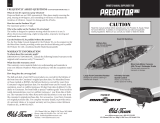Page is loading ...

Keep this Identification Number in case you must contact our Customer Service Department.
KAYAK OWNER’S MANUAL
Transportation
Use caution when transporting your
kayak. Be sure to tie down your kayak,
but do not overtighten the straps.
Paddle sports can be physically demanding and dangerous.
• Anyone using this watercraft may be at risk of serious injury or death.
• Obtain certified watercraft and first aid training, and carry first aid and
safety/rescue equipment.
• Consult a physician prior to beginning your paddle sport training.
• This watercraft is intended for recreational use only.
• This watercraft is not intended for mechanical propulsion.
• Scout unfamiliar waters; portage where appropriate.
• Never use this watercraft in rough, stormy, or white water conditions.
• This watercraft is not intended to be used as a lifesaving device.
• Always wear a Coast Guard approved personal flotation vest.
• Do not allow minors to use this watercraft without adult supervision.
• Do not use in areas where dangerous or strong current flows can overcome
your ability to control your direction or destination.
• Never use drugs or alcohol before or during operation of this watercraft.
• Always paddle with a buddy in case you require emergency help.
• Never use in cold water that may cause hypothermia.
• Always wear a helmet when appropriate.
• Check your equipment prior to each use for signs of wear or failure.
WARNING
Storage
Be sure to empty the kayak of all water.
You should clean the kayak by rinsing with
freshwater, especially if the kayak has been
used in salt water or becomes muddy.
Store the kayak out of direct sunlight.
Usage
Sit in the cockpit area of the kayak, centered in the provided seat area. Using the foot
braces, secure your feet so your knees are bent and feel sturdy. Paddle with your arms
evenly apart at a medium speed switching back and forth from one side to the other. The
paddle should enter the water around your shins and pull out of the water around your hips.
Keep this Identification Number in case you must contact our Customer Service Department.
KAYAK OWNER’S MANUAL
Transportation
Use caution when transporting your
kayak. Be sure to tie down your kayak,
but do not overtighten the straps.
Paddle sports can be physically demanding and dangerous.
• Anyone using this watercraft may be at risk of serious injury or death.
• Obtain certified watercraft and first aid training, and carry first aid and
safety/rescue equipment.
• Consult a physician prior to beginning your paddle sport training.
• This watercraft is intended for recreational use only.
• This watercraft is not intended for mechanical propulsion.
• Scout unfamiliar waters; portage where appropriate.
• Never use this watercraft in rough, stormy, or white water conditions.
• This watercraft is not intended to be used as a lifesaving device.
• Always wear a Coast Guard approved personal flotation vest.
• Do not allow minors to use this watercraft without adult supervision.
• Do not use in areas where dangerous or strong current flows can overcome
your ability to control your direction or destination.
• Never use drugs or alcohol before or during operation of this watercraft.
• Always paddle with a buddy in case you require emergency help.
• Never use in cold water that may cause hypothermia.
• Always wear a helmet when appropriate.
• Check your equipment prior to each use for signs of wear or failure.
WARNING
Storage
Be sure to empty the kayak of all water.
You should clean the kayak by rinsing with
freshwater, especially if the kayak has been
used in salt water or becomes muddy.
Store the kayak out of direct sunlight.
Usage
Sit in the cockpit area of the kayak, centered in the provided seat area. Using the foot
braces, secure your feet so your knees are bent and feel sturdy. Paddle with your arms
evenly apart at a medium speed switching back and forth from one side to the other. The
paddle should enter the water around your shins and pull out of the water around your hips.

2
Congratulations on your Lifetime
®
product purchase. By following the
instructions below, your new Lifetime product should provide you with years
of service and enjoyment.
Cleaning and Care
Lifetime
®
Kayaks are stain- and solvent-resistant. Most stains can be
removed, using a mild soap and a soft-bristled brush. Abrasive cleaning
materials may scratch the plastic and are not recommended. Avoid placing a
direct heat source on or near surfaces unless using a heat barrier.
Helpful Tips For Your Kayak
• Always store your kayak out of direct sunlight when not in use. Your
kayak is manufactured with UV-resistant color, but a kayak stored in
direct sunlight will begin to color fade over long periods of time.
• Your new kayak is molded of high-density polyethylene resin.
Periodically cleaning with mild soap and water is recommended to keep
your kayak looking new.
• Never drag any portion of the kayak over asphalt, rocky, sandy or
abrasive surfaces.
• Do not stand or sit on your kayak when out of the water. This can cause
damage to the hull.
• During regular use, it is normal to fi nd small amounts of water inside
the kayak. Carefully unscrew the drain plug and tilt the kayak to let the
water drain out. Secure the drain plug when fi nished.
• If your kayak has been exposed to hot sunlight, it is recommended to splash
water on the hull to cool the hot surface before it comes in direct contact
with your skin. This should also be done for any paddles you may have.
CLEANING & CARE
**For customers outside the U.S. or Canada, please contact the store for assistance.**
**U.S. and Canada customers ONLY**
IF ASSISTANCE IS NEEDED,
DO NOT CONTACT THE STORE!
CALL OUR CUSTOMER SERVICE DEPARTMENT at 1 (800) 225-3865
HOURS: 7:00 a.m. to 5:00 p.m. Monday through Friday (Mountain Standard Time)
**Call, or visit our Web site for Saturday hours**
Please save this instruction in the event you need to contact the manufacturer.
Please have the Product ID ready when you call; it is located at the bottom of the fi rst page of this
instruction.
#1160224 B 2/16/2017
2
Congratulations on your Lifetime
®
product purchase. By following the
instructions below, your new Lifetime product should provide you with years
of service and enjoyment.
Cleaning and Care
Lifetime
®
Kayaks are stain- and solvent-resistant. Most stains can be
removed, using a mild soap and a soft-bristled brush. Abrasive cleaning
materials may scratch the plastic and are not recommended. Avoid placing a
direct heat source on or near surfaces unless using a heat barrier.
Helpful Tips For Your Kayak
• Always store your kayak out of direct sunlight when not in use. Your
kayak is manufactured with UV-resistant color, but a kayak stored in
direct sunlight will begin to color fade over long periods of time.
• Your new kayak is molded of high-density polyethylene resin.
Periodically cleaning with mild soap and water is recommended to keep
your kayak looking new.
• Never drag any portion of the kayak over asphalt, rocky, sandy or
abrasive surfaces.
• Do not stand or sit on your kayak when out of the water. This can cause
damage to the hull.
• During regular use, it is normal to fi nd small amounts of water inside
the kayak. Carefully unscrew the drain plug and tilt the kayak to let the
water drain out. Secure the drain plug when fi nished.
• If your kayak has been exposed to hot sunlight, it is recommended to splash
water on the hull to cool the hot surface before it comes in direct contact
with your skin. This should also be done for any paddles you may have.
CLEANING & CARE
**For customers outside the U.S. or Canada, please contact the store for assistance.**
**U.S. and Canada customers ONLY**
IF ASSISTANCE IS NEEDED,
DO NOT CONTACT THE STORE!
CALL OUR CUSTOMER SERVICE DEPARTMENT at 1 (800) 225-3865
HOURS: 7:00 a.m. to 5:00 p.m. Monday through Friday (Mountain Standard Time)
**Call, or visit our Web site for Saturday hours**
Please save this instruction in the event you need to contact the manufacturer.
Please have the Product ID ready when you call; it is located at the bottom of the fi rst page of this
instruction.
#1160224 B 2/16/2017
/


